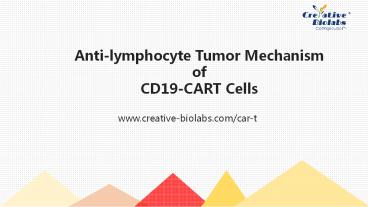Anti-lymphocyte Tumor Mechanism of CD19-CART Cells - PowerPoint PPT Presentation
Title:
Anti-lymphocyte Tumor Mechanism of CD19-CART Cells
Description:
Lymphoid malignancies include lymphocytic leukemia and lymphoma, which are tumors that occur on lymphocytes such as B cells, T cells, and NK cells. At present, there are many difficulties in its treatment, which are related to the recurrence and refractory of the diseases in the clinic. In the past 10 years, great progress has been made in the clinical treatment of lymphatic system tumors. Anti-CD20 monoclonal antibodies have been widely used in CD20-positive B-cell non-Hodgkin's lymphomas, and have achieved good results, becoming the first-line clinical application. However, since the cell surface of lymphoma and acute-chronic lymphocytic leukemia often has only CD19 antigen, an anti-CD20 antibody such as rituximab has no obvious therapeutic effect on it, therefore there is an urgent need for a new treatment method to improve the cure rate of lymphoma and acute and chronic lymphoma. – PowerPoint PPT presentation
Number of Views:26
Title: Anti-lymphocyte Tumor Mechanism of CD19-CART Cells
1
Anti-lymphocyte Tumor Mechanism of CD19-CART
Cells
www.creative-biolabs.com/car-t
2
Lymphoid malignancies
Lymphoid malignancies include lymphocytic
leukemia and lymphoma, which are tumors that
occur on lymphocytes such as B cells, T cells,
and NK cells. At present, there are many
difficulties in its treatment, which are related
to the recurrence and refractory of the diseases
in the clinic. In the past 10 years, great
progress has been made in the clinical treatment
of lymphatic system tumors. Anti-CD20 monoclonal
antibodies have been widely used in CD20-positive
B-cell non-Hodgkin's lymphomas, and have achieved
good results, becoming the first-line clinical
application. However, since the cell surface of
lymphoma and acute-chronic lymphocytic leukemia
often has only CD19 antigen, an anti-CD20
antibody such as rituximab has no obvious
therapeutic effect on it, therefore there is an
urgent need for a new treatment method to improve
the cure rate of lymphoma and acute and chronic
lymphoma.
3
Chimeric antigen receptor T cell
Chimeric antigen receptor T cell immunotherapy
(CART) cells help T lymphocytes express a
specific CAR through genetic modification. The
cell can specifically recognize the target
antigen and kill target cells. CART cells have a
high affinity for specific tumor antigens, so
that they can efficiently kill tumor cells
expressing the antigen.
CD19 is specifically expressed on the surface of
B-lymphocytes in different stages of
differentiation. CD19 antigen is expressed in
more than 95 of B-cell lymphomas and
B-lymphocytic leukemia. The establishment of CART
cells recognizing CD19 chimeric antigen receptors
that can achieve the therapeutic purpose of B
lymphocyte tumors.
4
- Cytotoxic T cells are CD8 T lymphocytes
activated by antigen presenting cells (APCs).
Studies have shown that activation of T cells
relies on activation of dual signaling pathways
to proliferate into cytotoxic T cells. Where the
first signalling pathway is the combination of
the MHC molecule-antigenic peptide complex on
APCs and T cell receptors, and the second
signaling pathway is the B7 co-stimulatory
molecule on the APC surface binds to the CD28
molecule on the T cell surface. When a cytotoxic
T cell meets with a tumor cell carrying the same
MHC molecule-antigen peptide complex, release of
perforin can result in cell lysis. In addition,
granzymes can be secreted to induce apoptosis in
target cells.
5
CAR T design
The key to CAR T design is to select the
appropriate tumor antigen as a target. Since CD19
is expressed at various stages of differentiation
of B lymphocytes, and other non-B cells do not
have CD19 expression, CAR for CD19 is currently
the most studied CART cell in clinical practice.
6
(No Transcript)
7
Contact us
45-1 Ramsey Road, Shirley, NY 11967, USA Email
marketing_at_creative-biolabs.com
8
Thank you

